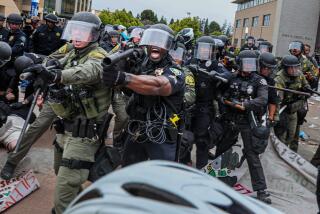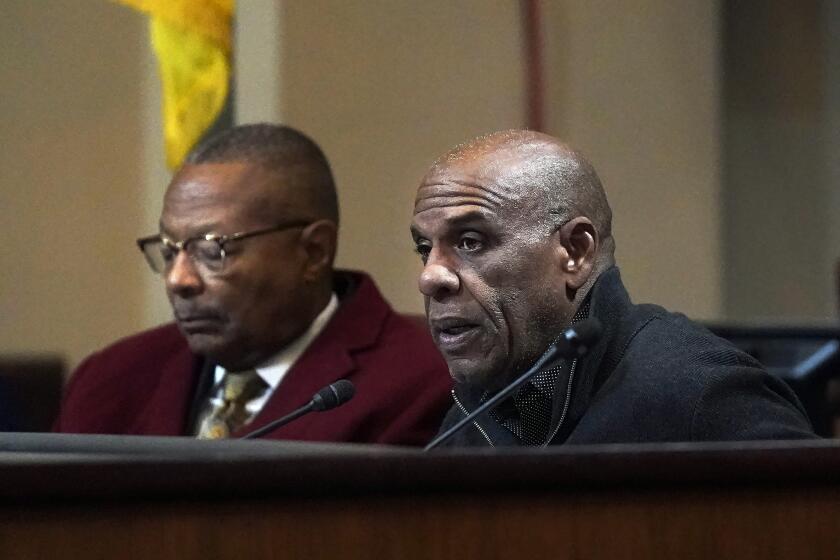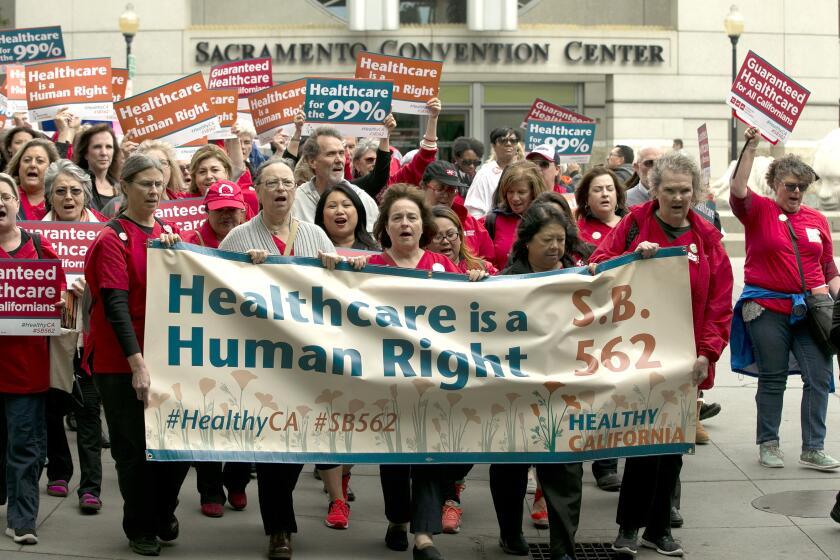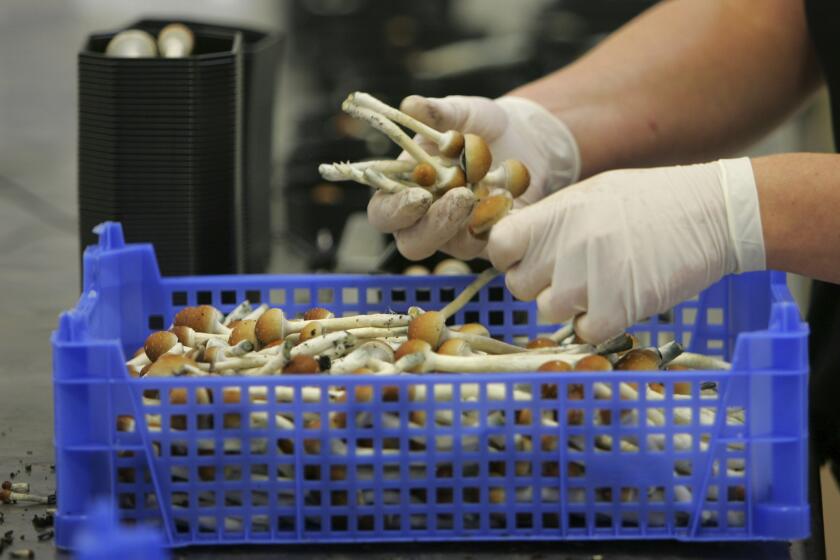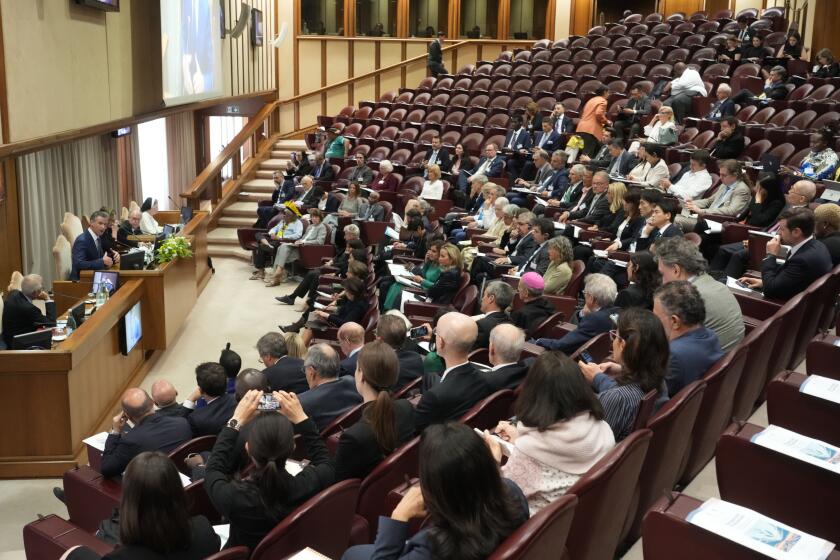High Court Says Police Not Liable in Chase Suits
The Supreme Court shielded police Tuesday from being sued in federal court for deaths and injuries resulting from high-speed chases--even reckless ones.
For California, where state law already makes police immune from such suits, the ruling closes the courthouse door to virtually all claims resulting from police pursuits.
In a 9-0 ruling, the justices rejected the claim that officers who recklessly pursue a fleeing vehicle through city streets or on freeways can be held liable for the damage they cause.
Officers are “often forced to make split-second judgments,” the high court said. When a suspect flouts the law and speeds away, “an officer’s instinct” is to give chase. His decision to pursue the fleeing vehicle, while perhaps unwise and imprudent, violates no one’s constitutional rights, the court ruled.
The decision throws out a federal lawsuit filed by the parents of a Sacramento teenager who died in 1990 when he fell from a motorcycle being chased by police at speeds of up to 100 mph.
A decade ago, the state Legislature passed a law making police immune from damage suits for claims arising from police pursuits. Some of the lawsuits were filed by surviving family members, as in the Sacramento case. But others came from bystanders who were hurt during a chase.
State laws protect police and their departments in state court, so long as the department has adopted guidelines for officers on when to initiate a pursuit.
Paul Hedlund, the Los Angeles lawyer who represented the Sacramento family, said Tuesday that he hopes state lawmakers will be spurred to act by the high court’s decision.
“California leads the nation in high-speed pursuit deaths. Hopefully the state will enact legislation to prevent a duplication of this kind of senseless tragedy,” he said.
About 300 Americans are killed each year in accidents involving police chases, roughly the same number as are killed in police shootings.
“For better or worse, police pursuits . . . have become a fixture of everyday police practice,” lawyers for several Southern California jurisdictions told the justices. From 1994 to 1996, the Los Angeles Police Department undertook 2,200 vehicle pursuits.
“This decision sends a clear message that a suspect does not have a right to flee from an officer,” said Deputy City Atty. Gregory P. Orland in Los Angeles. “We’re pleased the court said there is not any liability absent a deliberate effort to injure the suspect.”
Civil libertarians had urged the court to restrain police pursuits as a danger to the public. Two years ago, the American Civil Liberties Union of Southern California denounced the pursuit policies followed by the LAPD and the Los Angeles County Sheriff’s Department.
“We feel high-speed pursuits should be used when the police are pursuing a dangerous felon, not when it involves a traffic violation,” said Ramona Ripston, the ACLU’s executive director. “This decision absolves the police from any liability for deaths of innocent persons killed as a result of a reckless police chase.”
After Tuesday’s ruling, officials remain free to change their pursuit policies, but the decision removes the threat of potential liability.
For the Supreme Court, the case (County of Sacramento vs. Lewis, 96-1337) renewed the long-running debate about when an officer violates a citizen’s right under the Constitution. The justices noted that, unlike cases where a police officer shoots a suspect or allegedly beats him, the injuries or deaths in a pursuit case arise from accidents.
The justices considered two possible theories of liability and rejected them both. While the 4th Amendment forbids “unreasonable searches and seizure,” the court said that neither took place in the Sacramento case.
Because passenger Philip Lewis, 16, and the driver of the motorcycle sped away when Sacramento County Deputy Sheriff James E. Smith shouted for them to stop, they were neither searched nor seized, the court said.
The 14th Amendment prohibits the state and its officers from “depriv[ing] any person of life, liberty or property without due process of law.” More than a century ago, the court said that this provision protected citizens from “the arbitrary exercise of the powers of government.”
In the hands of liberal judges, this provision has been the funnel for bringing lawsuits into federal court against local and state officials.
The U.S. 9th Circuit Court of Appeals, siding with the parents of the Sacramento teenager, said the county Police Department could be held liable for violating the 14th Amendment because Officer Smith showed a “reckless disregard” for life when he undertook the high-speed chase.
Disagreeing, the high court said that “only the most egregious official conduct” that “shocks the conscience” rises to the level of a constitutional violation.
“We hold that high-speed chases with no intent to harm suspects physically . . . do not give rise to liability under the 14th Amendment,” Justice David H. Souter wrote for the court.
He left only one exception. If police act out of “an improper or malicious motive,” such as “to terrorize, cause harm or kill” a suspect, they can be sued, he said.
This leaves open the possibility of lawsuits if a police officer deliberately rams his squad car into a suspect’s vehicle. However, in the normal situation where officers are simply trying to catch a fleeing vehicle, they are immune from damage suits, Souter said.
In addition to throwing out the claim filed on behalf of the Sacramento teenagers who fled police, the decision also appears to bar damage claims from innocent bystanders.
One such pending lawsuit was filed by Gabriel Torres, a Pico Rivera man who was severely injured on the Hollywood Freeway four years ago when he was struck by a car fleeing California Highway Patrol officers at 130 mph.
Torres had sued the CHP, contending that the officers’ high-speed pursuit was unreasonably dangerous. Had the 9th Circuit’s ruling been upheld, his case would have gone before a jury in Los Angeles.
In another action Tuesday, the court refused to hear an appeal from a South Carolina woman who was sent to prison for giving birth to a baby born with cocaine in its system.
Under this first-in-the-nation policy, state prosecutors have charged women with the crime of child neglect if hospitals report that their babies were born with traces of illegal drugs. The South Carolina Supreme Court agreed that a viable fetus is a “person” under state law.
More to Read
Start your day right
Sign up for Essential California for news, features and recommendations from the L.A. Times and beyond in your inbox six days a week.
You may occasionally receive promotional content from the Los Angeles Times.

